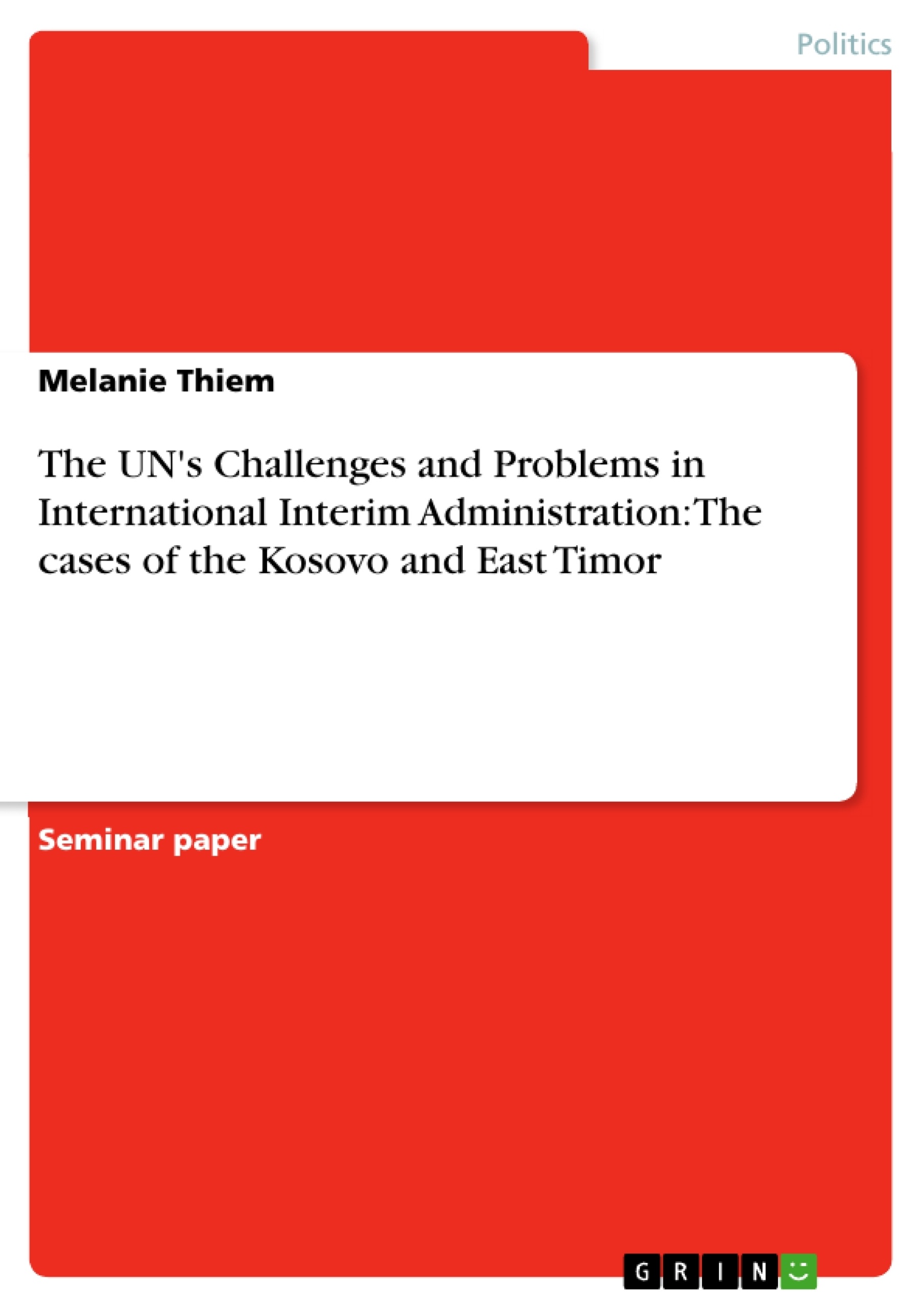Since the end of the cold war the number of UN peacekeeping missions raised drastically. This development within international affairs has been labelled the “new interventionism” (see for example Yannis 2002b: 826). But not only the absolute numbers increased, also the scope of these missions has undergone some fundamental changes. The mandates of traditional peacekeeping operations are expanded allowing UN forces to be actively engaged in operations which can be better described as peacebuilding missions (Brahimi 2000, Mortimer 2004: 10). However, the term “peacebuilding” is still not integrating the phenomenon of UN forces running the entire domestic administration of post-conflict societies. Within the scientific discussion the term “international interim administration” is therefore seen as more accurate to describe UN operations in territories such as Cambodia, Liberia, and Eastern Slavonia. This article adds to the scientific discourse by focusing on two of the most recent cases of UN Interim Administration: the United Nations Interim Administration Mission in Kosovo (UNMIK) and the United Nations Transitional Administration in East Timor (UNTAET). Whereas the UNTAET ended in 2002 with the release of East Timor into independence, UNMIK is still continuing and the question of the Kosovo’s final status remains open. While the outcome of these missions seems to be very different they were both facing similar difficulties which are characteristically for interim administrations. Therefore this paper is going to point out some specific problems and challenges of these missions. Special attention in this context will be directed towards the following issues. Taking the respective UN resolutions as a starting point for examination the article will take into account the challenges that are derived from the structure of the mandate and the question of state sovereignty in the context of international interim administration. Being amongst the most important aspects within those missions, the article additionally addresses the UN’s organisational capacity to accomplish these wide-ranging missions and the establishment of ad-hoc judicial systems.
Inhaltsverzeichnis (Table of Contents)
- Introduction
- The United Nations and its peacekeeping missions in the context of International Interim Administration
- Challenges and Problems of UN international interim administrations
- The Case of Kosovo
- The Kosovo – final status still in limbo
- UNMIK's problems in the Kosovo
- The Case of East Timor
- East Timor - finally independent
- UNTAET's problems in East Timor
- Conclusion and critical reflection
Zielsetzung und Themenschwerpunkte (Objectives and Key Themes)
This paper examines the challenges and problems faced by the United Nations in its international interim administration missions, specifically focusing on the cases of Kosovo and East Timor. It analyzes the UN's capacity to manage these missions effectively, considering the complexities of state sovereignty and the structure of the mandates.
- The increasing role of the United Nations in peace operations after the end of the Cold War
- The challenges of international interim administration, including the balance between state sovereignty and UN authority
- The UN's organizational capacity to manage complex and wide-ranging missions
- The establishment of ad-hoc judicial systems within interim administrations
- The unique challenges and problems faced by the United Nations in Kosovo and East Timor
Zusammenfassung der Kapitel (Chapter Summaries)
The paper begins by introducing the topic of international interim administration and outlining the context of UN peacekeeping missions. The second section delves into the history of the UN and its peacekeeping missions, examining the evolution of the UN Charter and the increasing scope of its operations. The paper then explores the general challenges and dilemmas associated with UN interim administrations, emphasizing the complexities of state sovereignty and the transfer of power.
The subsequent chapters focus on the specific cases of Kosovo and East Timor, providing historical background and outlining the problems faced by UN missions in these regions. The paper analyzes the challenges of establishing and maintaining stability, ensuring security, and promoting economic development in post-conflict societies.
The final chapter will offer a comprehensive summary of the paper's conclusions and provide a critical reflection on the arguments presented. It will highlight the key challenges and potential solutions for future UN interim administration missions.
Schlüsselwörter (Keywords)
The paper focuses on international interim administration, UN peacekeeping missions, state sovereignty, organizational capacity, judicial systems, Kosovo, East Timor, UNMIK, UNTAET, and the challenges of peacebuilding in post-conflict societies. It examines the complex relationship between the UN and national governments in situations where the UN assumes significant administrative and governance roles.
Frequently Asked Questions
What is "international interim administration" in the UN context?
It refers to UN operations where international forces and administrators run the entire domestic administration of a post-conflict society, going beyond traditional peacekeeping.
What are the main differences between the UN missions in Kosovo and East Timor?
UNTAET in East Timor ended in 2002 with the territory's independence, while UNMIK in Kosovo has continued for a longer period with the final status of the region remaining complex.
What challenges regarding state sovereignty do these missions face?
Interim administrations create a complex balance between the authority of the UN and the legal sovereignty of the state, often leading to dilemmas in governance and power transfer.
How does the UN establish judicial systems in these territories?
The UN often has to establish ad-hoc judicial systems to ensure the rule of law when local structures have collapsed or are considered biased following a conflict.
What organizational problems does the UN encounter in such large-scale missions?
The UN faces challenges in organizational capacity, including recruiting qualified personnel quickly and managing wide-ranging mandates that cover everything from security to economic development.
- Arbeit zitieren
- Melanie Thiem (Autor:in), 2006, The UN's Challenges and Problems in International Interim Administration: The cases of the Kosovo and East Timor, München, GRIN Verlag, https://www.grin.com/document/66567



